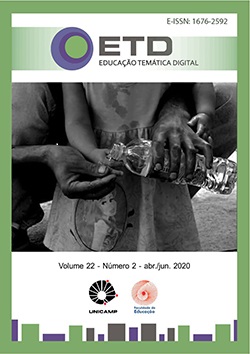Abstract
This study addresses the text space to unfold, in and by writing, problems that prospect the research in Education through the way of poetics. It understands that research, when done by writing, does not transcribe a previous reality, but creates a reality in the composition of the text; that this reality, then, can only be accessed through a fictional route. To this end, this study shows some questions on which it draws lines that define our provisional points, anchorages to think the thinking that thinks the writing of and in the research in Education. Thus, it puts the thought and its relation to the unknown in scene. In fact, this researcher who dramatizes through writing is composed in a co-existential space, in which the notion of authorship is reviewed and exchanged with the image of the narrator of a fiction. This image, in turn, is taken as an autofiction while it puts the writing in relation to a certain notion of performance. The researcher, in this process, becomes the one who narrates the research when composing, also, in this fictional, multiple, polyphonic and polysemic space.
References
BAHIENSE, Vera. A vida modo de usar: um romance em puzzle. Matraga, Rio de Janeiro, RJ, n.9, p. 81-84, out. 1997.
BARTHES, Roland. O rumor da língua. Tradução Mario Laranjeira. São Paulo: Martins Fontes, 2004.
CALVINO, Italo. As cidades invisíveis. Tradução Diogo Mainardi. São Paulo: Companhia das Letras, 1990.
CORAZZA, Sandra Mara. O que se transcria em Educação? Porto Alegre: UFRGS; Doisa, 2013.
ECO, Umberto. Sobre a literatura. Tradução Eliana Aguiar. Rio de Janeiro: Record, 2003.
DELEUZE, Gilles. Diferença e repetição. Tradução Luiz Orlandi e Roberto Machado. Rio de Janeiro: Graal, 1988.
DELEUZE, Gilles. Foucault. Tradução Renato Ribeiro. São Paulo: Brasiliense, 2006.
FOUCAULT, Michel. O Que é um Autor? In: FOUCAULT, Michel. Ditos e Escritos: Estética – literatura e pintura, música e cinema (vol. III). Rio de Janeiro: Forense Universitária, 2001. p. 264-298
FOUCAULT, Michel. A escrita de si. In: O que é um autor? Lisboa: Passagens, 1992. p. 129-160.
GRANIER, Jean. Nietzsche. Tradução Denise Bottmann. Porto Alegre: L&PM, 2009.
KLINGER, Diana Irene. Escritas de si, escritas do outro: autoficção e etnografia na narrativa latino-americana contemporânea. 2006. 209 f. Tese (Doutorado em Letras) - Instituto de Letras, Universidade do Estado do Rio de Janeiro, Rio de Janeiro, 2006.
LARROSA, Jorge. Nietzsche e a educação. Tradução Samíramis Gorini da Veiga. Belo Horizonte: Autêntica, 2009.
NIETZSCHE, Friedrich. O nascimento da tragédia. Tradução Heloisa da Graça Burati. São Paulo: Rideel, 2005.
REZENDE, Luiz. É escrevendo que se vira escrevedor. In: QUENEAU, Raymond. Exercícios de estilo. Rio de Janeiro: Imago, 1995. p. 11-15.
SAER, Juan José. O conceito de ficção. Desterro, SOPRO - panfleto político-cultural, v.15, agosto de 2009. Disponível em: http://culturaebarbarie.org/sopro/n15.pdf . Acesso: 20 mar. 2018.
VALÉRY, Paul. Introdução ao método de Leonardo da Vinci. Tradução José Martins Garcia. Lisboa: Arcádia, 1979.
The ETD - Digital Thematic Education uses the Creative Commons license (CC), thus preserving the integrity of the articles in an open access environment.


